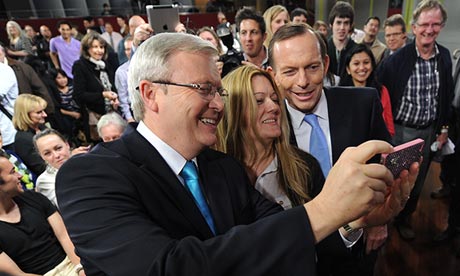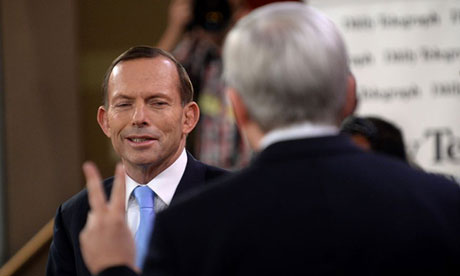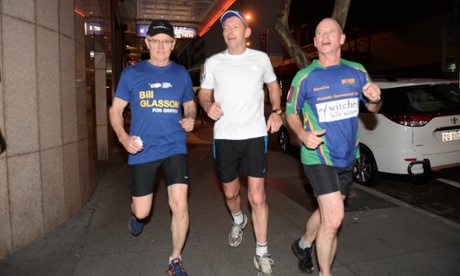Bridie Jabour in Sydney
theguardian.com, Friday 30 August 2013
NSW Independent Commission Against Corruption finds former mining minister Ian Macdonald acted corruptly when he granted lucrative coal licence
Ian Macdonald arriving to give evidence at the Independent Commission Against Corruption in Sydney on 14 February. Photograph: AAP
The corruption watchdog has referred former Labor New South Wales mining minister Ian Maconald to the director of public prosecution for possible charges after finding he was corrupt for the third time.
The Independent Commission Against Corruption also found former mining union official John Maitland was corrupt and referred him to the DPP to consider laying charges against him for giving false and misleading statements to ICAC and discussing evidence he gave in confidence to ICAC.
ICAC handed down its report into Operation Acacia on Friday morning. It examined the granting of a coalmining exploration licence in the Hunter valley in NSW by Macdonald to Doyles Creek Mining, a company owned by Maitland, without putting out a tender.
Macdonald announced the mine in a press release on Christmas Eve in 2008 and Maitland made $15m from a $160,000 investment.
Craig Ransley and Andrew Poole, businessmen involved in the deal, were also found to have acted corruptly by ICAC.
Maitland has suggested he may take legal action in response to the findings, saying he continues to “vehemently deny” he acted corruptly. "I will be having discussions with my legal team as to my legal options," he said.
“Because of the structure of ICAC, people who are being investigated are often denied a full chance to present their case, under fair rules of evidence,” Maitland said in a statement released through his solicitor.
“Yet they can suffer irreparable reputational harm as a result of this process as I have.”
The Greens have used the findings to say they will block any potential federal legislation in the Senate which hands environmental powers back to the states as the findings show the states cannot be trusted.
"Development decisions by successive state governments have shown the close relationship between state governments and developers can lead to decisions where the environment is the lowest priority," Greens lead Senate candidate for NSW Cate Faehrmann said.
"The Commonwealth must ensure our national environmental assets are protected and that areas of high biodiversity value do not come under threat from coal seam gas and coal mining."
Earlier this month ICAC made two other separate corruption findings against Macdonald for his role in the granting of a coal exploration mining licence which stood to make Labor powerbroker Eddie Obeid’s family up to $100m and for accepting favours – which included the services of a prostitute – to introduce the businessman Ron Medich to energy executives who had lucrative state contracts.
Macdonald acted against the advice of his department when he granted Doyles Creek Mining an exploration licence and the company was later sold to NuCoal and listen on the stock exchange making its directors and investors more than $80m.
In the report ICAC found Macdonald was not a credible witness and attempted to avoid answering difficult questions during the hearing by giving long and irrelevant answers, being argumentative and saying he could not remember “strikingly important” matters.
“From time to time, he gave evidence that was inconsistent with earlier evidence,” the report said.
“Some of his evidence was inherently improbable. At times, he also appeared to be making up evidence as he went along.”
Maitland was also criticised as not acting honestly and the commission found he gave false and misleading documents about the deal to the Department of Primary Industries, to union branches and to members of the local community.
Maitland’s lawyer had argued that he had long advocated for the health and safety of mining employees as secretary of the CFMEU and had been pushing for a training mine for years. He argued DCM wanted the coal exploration licence granted so they could build a training mine but ICAC rejected suggestions Maitland was not also driven by the financial gain he would get from the licence approval.
ICAC found Maitland and Macdonald were “mates” and the proposal for a training mine was used as “spin” to get the exploration licence and at a meeting between Maitland and others involved in DCM they discussed the need for Macdonald to make a “compelling argument” for approving the mine and that it should not be seen as a “goldmine for entrepreneurs”.
The report said the focus of the meeting was on making an impression rather than the substance of the proposal.
ICAC rejected Maitland’s assertions his sole motive for gaining the exploration licence was to build a training mine but accepted he had a genuine interest in building one.
ICAC instead found the argument for a training mine from DCM had been mainly used to avoid an expensive competitive tender process
“The training idea was indeed important to them, but only as the hook that was going to catch the commercial mine,” the report said.
Maitland rejected these assertions in a statement saying the findings against him were very limited.
“I have always passionately supported the concept of a training mine,” he said.
“Witness after witness stated as much in the hearing. The training of mineworkers underground improves their skills, benefiting them and the broader industry. Most importantly, it improves safety and saves lives.”
ICAC did not make any corruption prevention recommendations but noted the investigation, along with other investigations, raised issues around improper use of power by a minister and a separate report into the issues would be released soon.
Ian Macdonald: ICAC brands former NSW minister corrupt | World news | theguardian.com












 Bill Glasson (left) on a morning run with Tony Abbott and Queensland premier Campbell Newman. Photograph: Alan Porritt/AAP
Bill Glasson (left) on a morning run with Tony Abbott and Queensland premier Campbell Newman. Photograph: Alan Porritt/AAP






